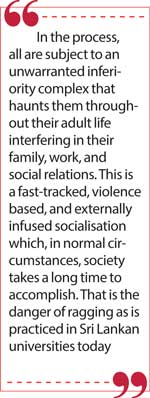Thursday Feb 19, 2026
Thursday Feb 19, 2026
Wednesday, 14 May 2025 00:55 - - {{hitsCtrl.values.hits}}

What usually happens is that civil society rises against ragging only when a brutal act is committed leading to a like manner horrendous outcome
 Plethora of laws to prevent ragging
Plethora of laws to prevent ragging
The death by suicide of an undergraduate of the Sabaragamuwa University, alleged to have been caused by severe mental trauma inflicted on him by some senior students through ragging, has made Sri Lanka’s civil society to rise against this unwholesome practice at universities. Even Sri Lanka’s Bar Association or BASL had issued a statement condemning this incident calling for authorities to take action against the culprits to prevent such incidents in universities.1
They have even cited various laws under which the authorities can act: Prohibition of Ragging and Other Forms of Violence in Educational Institutions Act of 1998, Convention Against Torture and Other Cruel, Inhuman, and Degrading Treatment or Punishment Act of 1994 and the relevant provisions in the Penal Code of the country making such acts criminal offences. Hence, there is a plethora of laws in the country which have prohibited such acts of ragging at universities, and which can be used by law enforcement authorities to take the alleged culprits for adjudication by houses of justice.
Ragging: mutually agreed exchange between the culprit and the victim
But the problem has been that none of these laws have been used in the past as a preemptive measure to put a stop to ragging at universities. Whenever a new batch of students is taken to universities, the university academics in protest of ragging that goes on unabated before their own eyes have chosen not to participate in any social activity organised by students unless they stop ragging of the newcomers. These protests have also gone to deaf ears. Therefore, ragging has become a sub-culture within the student community where seniors will subject new students to ragging and new students willingly or unwillingly suffering it.
In economics terms, it is a ‘mutually agreed give and take exchange’ and therefore there is no incentive for the victims to report on the incidents to authorities. So long as ragging is practiced through mutual cooperation of the culprit and the victim, it does not come to light. What usually happens is that civil society rises against ragging only when a brutal act is committed leading to a like manner horrendous outcome. Reacting to the unwholesome incident only after the event has happened is not the way to put a stop to instances of ragging if the civil society does not approve it.
Instances of ragging going unnoticed
There are many instances where ragging has gone unnoticed. In one instance known to me personally, a female student who had joined the university from a school in Colombo had been addressed in obscene language by raggers – some of them happened to be senior female students – possibly because of the envy they had harboured for her school. Unable to suffer it anymore, she had got herself dropped out of the university shattering her dream of pursuing a higher education career. Fortunately, her parents had money and therefore were able to pack her to the UK to continue her higher education there. She is now a world-class cybercrime expert, and her services had been lost to Sri Lanka.
Taming superiority complex
 The raggers think that it is their duty to force-expose the newcomers to the harsh realities in society, which is not orderly, tolerant, and supportive. Some students, especially from high classes, may be having a superiority complex in their heads and raggers seek to remove that superiority complex by subjecting them to both physical and mental abuse. That is the reason for addressing them, especially the female students from Colombo schools, in obscene language.
The raggers think that it is their duty to force-expose the newcomers to the harsh realities in society, which is not orderly, tolerant, and supportive. Some students, especially from high classes, may be having a superiority complex in their heads and raggers seek to remove that superiority complex by subjecting them to both physical and mental abuse. That is the reason for addressing them, especially the female students from Colombo schools, in obscene language.
In the process, all are subject to an unwarranted inferiority complex that haunts them throughout their adult life interfering in their family, work, and social relations. This is a fast-tracked, violence based, and externally infused socialisation which, in normal circumstances, society takes a long time to accomplish. That is the danger of ragging as is practiced in Sri Lankan universities today.
Nalanda Monastery: scholar at the gate to rag newcomers
But in a scholarly institution, ragging can be used to eliminate the superiority complex in knowledge of students by subjecting them to difficult riddles. In that case, only those who pass the test are admitted. For instance, in the ancient Nalanda Monastery in India, there was a scholar-at-the-gate called ‘dvarapandit’ who tested the oncoming students via a series of difficult questions to answer. Only those who could give correct answers were admitted as students.2 It is reported that only two or three out of ten had succeeded in gaining admission.
I recall that in the old Vidyodaya University in late 1960s a senior student was used to giving such a test to newcomers. For instance, if a new student says that he wants to do ‘archaeology’ as a subject, he is asked to spell it correctly. If he fails, the newcomer is asked to spell the word correctly thousand times. It is also a form of ragging but with a positive outcome without inflicting a life-long mental trauma.
Sri Lanka’s ragging: Destruction of creative minds
In a previous article in this series, I have touched upon the issue of ragging in Sri Lankan universities.3 The analysis in that article said that ragging at universities destroyed the creativity of a generation and is still valid. The following sections the present article draw heavily on that article.
Crème of brains going astray
Universities in Sri Lanka are supposed to recruit the crème of the top young brains by subjecting them to a highly competitive admission test administered as the GCE (Advanced Level) examination. Hence, they harbour right from the very beginning a superiority complex in them demanding all others to treat them as an unquestionable elite group. But they are simply throughputs that go through the university’s educational machinery. From society’s point, if they are to be of use to prospective employers, they should acquire certain qualities in the learning process.
Ready-to-use human resource unit
First, they must be a ready-to-use human resource. Employers hire those graduates in the hope that they could produce a good or a service which they can sell in the market at a price. From their point, the graduates passing out from universities are ‘ready-to-use human resource units’. ‘Ready-to-use’ means that once they are placed in jobs, they should be able to use their acquired skills to produce a good or a service immediately with no need for further training. A resource means that once they are employed, they should be able to produce an output that can be sold in the market. The normal microeconomic principles involving the diminishing marginal productivity are also applicable to them. There are certain qualities which employers expect of graduates if they are to become a resource which is readily usable.
Flexibility in attitudes
Second, they should have the flexibility to merge with organisational cultures and should have the right attitudes to work in an organisation. Those attitudes should enable them to absorb the cultural values of the organisations they join and work for the furtherance of its goals. If they are hard-lined and unable to appreciate those cultural values, the result would be the emergence of continual conflicts that lead to low productivity, low output and finally, low profits. Such an organisation is unable to withstand the competitive onslaught of competitors and will go out of business soon. Along with the bankruptcy of the organisation, the graduates too will lose their jobs. Hence, the employers normally give a very high weight to the attitudinal base of the new recruits.
Willing and able learners
Third, they should be willing and able learners. Knowledge becomes obsolete fast due to the introduction of new technology and changes in the systems. One good example is the displacement of double-entry bookkeeping by the new distributed digital ledger system known as the Blockchain, the operating system governing the new digital currencies, mainly, Bitcoin. As such, employees should be ready to throw out old knowledge and equip themselves with new knowledge. This applies not only to work routines but also technical skills which they should have to deliver their output. Employers love to hire people who are ready to invest their time, money and efforts in new learning.
Productive team members
Fourth, they should be able to work as productive team members. Accordingly, they should have an extraordinary capacity to work with others to produce outputs in teamwork arrangements. One is unlikely to work as an effective member of a team unless he has good social skills that help him to have good interpersonal relations with others. Modern outputs are not individual based but produced by the combination of many people.
Effective communicators
Fifth, they should have the ability to communicate effectively with others. This is because a modern worker, since he or she must work with others, should have excellent communication skills, both verbal and written. One should be able to communicate at least in one language. However, to learn of new developments, he or she should essentially have competence at least in one international language. This is where learning a foreign language like English becomes important.
Creative workers
Sixth, they should be creative workers with ability to think out of the box and come up with inventive and innovative ideas. Without developing this quality, there is no meaning or value in any learning. It is this quality that will help them to use the knowledge they have gained to resolve practical problems which their organisations face.
Shattered hopes of society
Therefore, there are high hopes which society and employers place on university graduates. The ragging done in Sri Lankan universities, a misconceived adaptation from British universities, shatters these hopes. In British universities, there is also ragging but it is not the freshmen who are subject to ragging but the senior students.
Rag week in the University of York, UK
I had the experience of observing the ragging that took place at the University of York, UK in 1977. There was a ‘rag week’ and it took place not in September when the new students were admitted but in February when the Spring Semester started. It was organised by the university’s student union with deliberate pre-planning done with full cooperation of the university authorities. The details of the rag week organised by the University of York Student Union in 2016 have been given in the university’s official website and they are not different from what I had observed nearly 48 years ago.4
The objective of the rag week 2016 has been explained by the student union as follows: “YUSU RAG brings you fun, cross-campus, events and adventurous activities – in aid of good causes. Take a little time away from your studies: explore the secrets of student life in York on our Freshers’ Week Scavenger Hunt or sign up for our charity challenge Trek. Just taking part helps. York students do their bit for the wider world. But that’s not all you can do… Join our sociable team and help make things happen; Run your own Fundraising event/activity with support from us; Sponsor a friend in their York fundraising effort.” A similar event had been organised in 2022/23 at which rag has been more aptly described as ‘Raising (funds) And Giving’.5
Constructing a 25p wall as charity
The rag week in 1977 was announced by the Vice Chancellor, and it consisted of several events aiming at raising funds for a good cause. Students were coaxed to participate in the events voluntarily. There were social events, entertainment in the nights, sports, challenge walks, numerous fund-raising campaigns that enable the students to support a charity at the end. Thus, there were dancing, singing, martial art demonstrations, food fairs and various other activities hosted by students coming from different countries and cultures. Students in all the four years participated in these events voluntarily. The challenge for them in 1977 was to build a hypothetical wall of 25 pence coins from the university’s Library Gate to the York City Gate which was about 4 km away from the university.
The student union had calculated the amount of Sterling Pounds needed to build this hypothetical wall when standing coins are placed touching each other through this distance. Then, targets were given to each student group to raise funds. I recall that by the end of the week, students at the university managed to raise more than the needed amount to erect this wall. At the end of the week, at a function attended by all the students, the Vice Chancellor congratulated them on the successful completion of the rag week and the raising of funds for donation to a charity. In 1977, it was a donation to an old people’s house in Yorkshire. But in 2016, as the website under reference has pronounced, it had been numerous charities for which each college of the university had to raise funds for giving support.
Failing to learn English
The mass ragging being practiced by Sri Lanka university students prevents them from concentrating on studies. It is presently done for three months during which new students should dress themselves in frugal attire, wear only slippers, and follow learning sessions conducted by interested political groups to convert them to be radical students. Though there are supportive English classes during the first six months, students fail to attend them and improve their competency in the language, a must for their subsequent learning at the university. A few students have been able to overcome this deficiency because they have the supportive family background but those who come from remote areas or unprivileged families are condemned to suffer from it forever.
Need for acting promptly and decisively
Ragging is a criminal offence, as announced by SLBA, and it is time to act against those violators of the law of the country.
Footnotes:
1https://basl.lk/the-basl-statement-on-the-recent-incident-of-ragging-at-the-sabaragamuwa-university/
2https://theprint.in/pageturner/excerpt/nalanda-had-a-scholar-at-the-gate-to-screen-students-only-three-out-of-10-were-admitted/2482002/
3https://www.ft.lk/w-a-wijewardena-columns/University-ragging--Destroying-the-creativity-of-a-generation/885-649224
4https://www.yusu.org/opportunities/rag
5https://yorksu.org/news/article/RAG-Beneficiary-Vote-2022
(The writer, a former Deputy Governor of the Central Bank of Sri Lanka, can be reached at [email protected].)